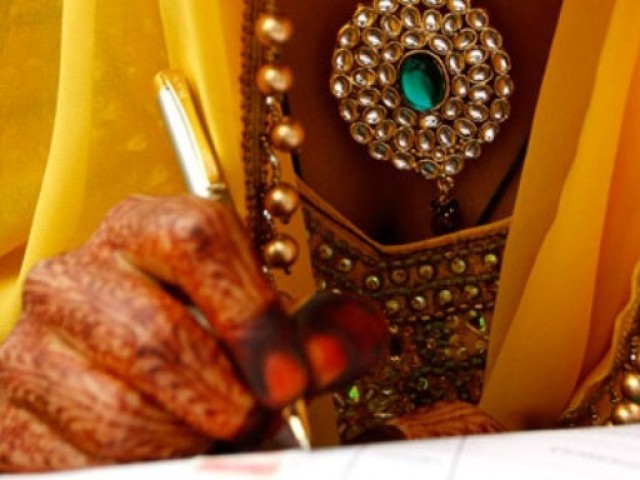
While the double-digit inflation has undoubtedly altered the lifestyle choices of families, parents looking to wed their daughters have not been spared either, as the curse of dowry translates into exorbitant expenditures on nuptials - which is compelling some to defer their daughters’ weddings to more fortunate times.
In Pakistan, weddings have always been a lavish affair since people belonging to all socio-economic backgrounds plan ahead and save plentifully for their children’s big day, especially their daughters’ weddings, which normally involves multiple rites of passage, with each demanding gaudy clothing and gold jewellery for the brides’ trousseau and decorated venues and extravagant menus for the celebratory events.
In recent times however, peaking inflation and a loss of purchasing power has dimmed citizens’ desire for big fat weddings, as many parents seek to limit the number of events and guests in order to cut costs but they cannot seem to escape the ineradicable vice that is dowry.
Farzana, a mother of two unmarried daughters, shared her struggle finding decent suitors for her daughters, who would not overburden her with demands for dowry.
“It has become impossible for parents today to arrange furniture, kitchen accessories, clothes and gold jewellery for their daughters’ dowry.
What is even harder is finding respectable men, who would be willing to accept their wives without said dowry,” expressed Farzana, who further added that she had no choice but to delay her daughters’ marriage until a decent proposal came through.
As per inconclusive market estimates, wedding expenditures have increased by at least 30 to 50 per cent during the past year, presenting a conundrum for numerous low and middle-class families, who struggle to prepare a dowry for their daughters.
“Giving gold to daughters on their marriage seems like a remnant of the past,” nostalgically opined Sultana Bibi, a matchmaker.
“How can parents spend extra money buying precious metals, when many have started abandoning traditional events like the betrothal ceremony and are only buying bridal dresses for the main wedding event?” Saad, a seller of bridal outfits, confirmed Sultana’s observation, when he revealed that he had witnessed a sharp decline in the number of outfits purchased by brides for their weddings.
Similarly, Salman, a furniture seller, too reported a change in the preferences of parents, who now chose to opt for cheaper, low-quality items for their daughters dowry, in order to control their expenditures.
Sajid, a catering worker, has also noticed a similar trend in the guest lists of clients, who now increasingly prefer smaller gatherings for each wedding event, with 250 people at most.
“Not only are people celebrating fewer rituals, but they are also inviting fewer people and are serving selected dishes,” he claimed.
Sajid’s claims were supported by Shoaib Khan, a resident of Mehmoodabad, who married off his sister, within a limited budget with few events, an exclusive guest list, and a basic menu.
“We did not perform any Mehndi or Mayon rituals.
The Nikkah took place at the mosque and two days later my sister departed with her husband, surrounded by 100 guests, who were served biryani and kheer only,” shared Khan, who felt that marrying off daughters and sisters in a budget was not impossible, if only the culture of dowry could be eliminated from society.
Speaking to the Express Tribune on the matter, Sindh’s Minister for Women Development Syeda Shehla Raza, conceded to the fact that dowry had assumed the status of an ineradicable vice.
“Collective efforts are needed to end the curse of dowry in the society and to abandon the extravagant rituals on the occasion of marriage, which complicate the union of numerous couples.
The Sindh government has taken strong steps for the rights of women and shall continue doing so in the future,” said Raza.

1730793476-0/bella-(1)1730793476-0-405x300.webp)

1723119450-0/jlo-ben-(6)1723119450-0-165x106.webp)

1730270970-0/BeFunky-collage-(84)1730270970-0-165x106.webp)










1730706072-0/Copy-of-Untitled-(2)1730706072-0-270x192.webp)
COMMENTS
Comments are moderated and generally will be posted if they are on-topic and not abusive.
For more information, please see our Comments FAQ